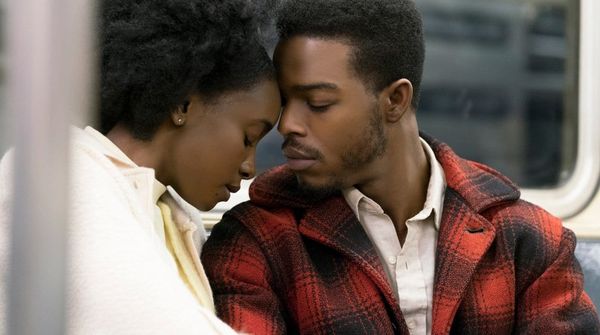Eye For Film >> Movies >> If Beale Street Could Talk (2018) Film Review
If Beale Street Could Talk
Reviewed by: Jennie Kermode

In cinema, if you've got a right to sing the blues, you'll know that they belong in black and white or low-lit red and gold, grainy-textured images of alleyways with drifting smoke, crowded domestic spaces with densely patterned wallpaper, light from bars and shop windows leaking out into dark streets. It's a language that Barry Jenkins knows note for note and it suffuses every moment of this adaptation. Beale street, reputedly the places where the blues were born, looms large in James Baldwin's encapsulation of the African American experience, and Jenkins scores it with trumpets and strings. But there's a danger here, and that's that the atmosphere will overwhelm the story.
Jenkins works hard to keep things in balance. He has a talented cast to help him, with KiKi Layne and Stephen James easy to feel for as the wide-eyed young lovers Tish and Fonny, and Regina King a standout in the anguished role of the former's mother. There's good chemistry between additional cast members, which is vital to the sense of community at the story's core. This provides warmth during the film's darkest moments yet by implication, though Jenkins never really draws out this aspect of the story, it allows for the preservation of a status quo that might otherwise be intolerable, and which ought not to be tolerated.

Though the story is told in non-linear fashion, problems for the young lovers really begin when Fonny refuses to tolerate a white man groping Tish in a shop - the sexual assault being an act that is not only offensive in itself but serves as a reminder of black people's lack of ownership over heir own bodies in the eyes of many whites. The altercation that follows brings our young hero to the attention of a bitter white cop (presented in a heavy-handed style which, unfortunately, makes it all too easy to perceive him as an exception to the rule), and from then on it's just a matter of time until he finds himself facing an obviously false rape accusation, albeit one made by a genuinely traumatised woman. With Tish expecting a baby, the two families are desperate to resolve the situation - but in a country where, even today, more than half of black men are arrested before they reach their mid-twenties, the odds are clearly stacked against them.
Intermingling scenes of despair at Fonny's situation with scenes addressing the young couple's hopes and dreams before it all goes wrong, Jenkins gives us the alternating highs and lows of a good blues song. One of the hallmarks of the blues, however, is its ability to shift gears and undermine naively hopeful narratives. For all that we see things getting worse, Jenkins preserves the story's central emotional dynamic in pristine form, thereby removing the darkest element of Baldwin's story. This may make it more accessible to mainstream audiences but, in the process, it robs it of some of its power. It's just a little bit too polished, too smoothly romantic to ring true, and it externalises all the blame for its characters' predicament, something which, whilst it's politically appealing, simplifies matters in a way that undermines the potential for action.
A powerful condemnation of endemic and structural racism, a sweet love story and, at a technical level, a beautifully produced film, If Beale Street Could Talk has much to recommend it. Nevertheless, it feels compromised and simplified to the point where it falls short of its potential.
Reviewed on: 04 Jan 2019
















